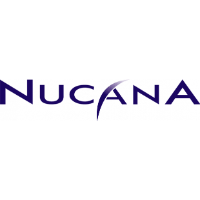
FMP

NuCana plc
NCNA
NASDAQ
NuCana plc, a clinical-stage biopharmaceutical company, engages in the development of products for the treatment of cancer. The company develops its products based on its proprietary ProTide technology. Its lead product candidate includes Acelarin, which is in Phase I clinical trial for patients with advanced solid tumors; Phase Ib for patients with recurrent ovarian cancer; Phase Ib clinical trials for the treatment of patients with biliary tract cancer; Phase II clinical trial for the treatment of patients with platinum-resistant ovarian cancer; and Phase III clinical trial for the treatment of patients with pancreatic cancer. The company is also developing NUC-3373, a ProTide transformation of the active anti-cancer metabolite of 5-fluorouracil, which is in Phase I clinical trial for the treatment of patients with advanced solid tumors and in a Phase 1b/2 clinical trial for patients with advanced colorectal cancer; and NUC-7738, a nucleoside analog that is in Phase 1/2 clinical trial for the treatment of patients with advanced solid tumors and hematological tumors. It has a research, collaboration, and license agreement with Cardiff University and University College Cardiff Consultants Ltd. for the design, synthesis, characterization, and evaluation of ProTides; and an assignment, license, and collaboration agreement with Cardiff ProTides Ltd. The company was formerly known as NuCana BioMed Limited and changed its name to NuCana plc in August 2017. NuCana plc was incorporated in 1997 and is headquartered in Edinburgh, the United Kingdom.
1.21 USD
0 (0%)

EBIT (Operating profit)(Operating income)(Operating earning) = GROSS MARGIN (REVENUE - COGS) - OPERATING EXPENSES (R&D, RENT) EBIT = (1*) (2*) -> operating process (leverage -> interest -> EBT -> tax -> net Income) EBITDA = GROSS MARGIN (REVENUE - COGS) - OPERATING EXPENSES (R&D, RENT) + Depreciation + amortization EBITA = (1*) (2*) (3*) (4*) company's CURRENT operating profitability (i.e., how much profit it makes with its present assets and its operations on the products it produces and sells, as well as providing a proxy for cash flow) -> performance of a company (1*) discounting the effects of interest payments from different forms of financing (by ignoring interest payments), (2*) political jurisdictions (by ignoring tax), collections of assets (by ignoring depreciation of assets), and different takeover histories (by ignoring amortization often stemming from goodwill) (3*) collections of assets (by ignoring depreciation of assets) (4*) different takeover histories (by ignoring amortization often stemming from goodwill)